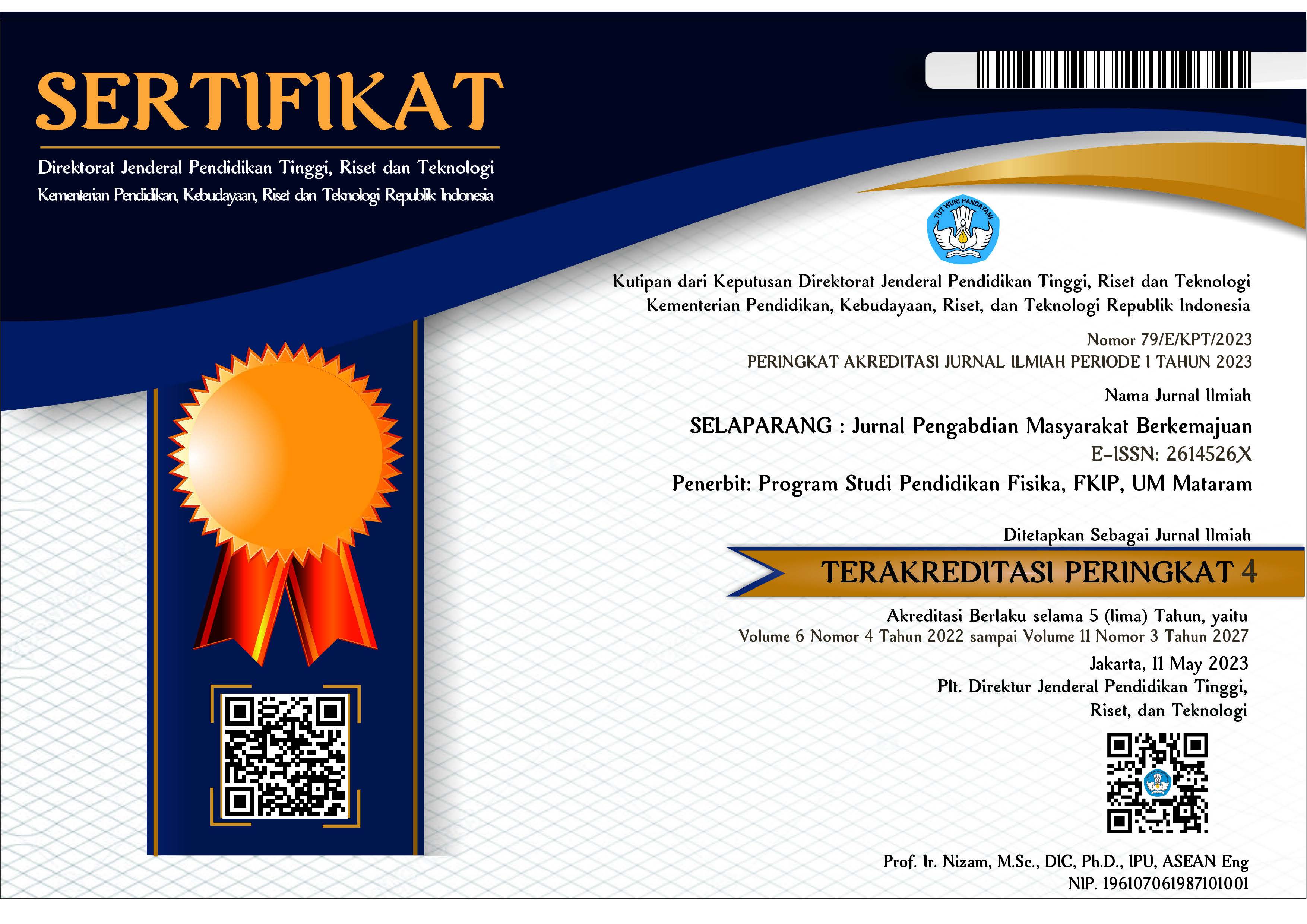OPTIMALISASI MARKET SHARE HOME INDUSTRY CUTELLA PRESTO BERBASIS DISTRIBUTON CHANNEL DI KABUPATEN JEMBER
Abstract
ABSTRAK
Home industri keripik singkong Cutella Presto merupakan salah satu bentuk industri makanan ringan berbahan dasar singkong yang berlokasi di Desa Mangli Kecamatan Kaliwates Kabupaten Jember. Distribusi ke pasar di luar Kabupaten Jember biasanya dibuat berdasarkan pesanan, dimana pengiriman pesanan menggunakan jasa pengiriman dengan biaya yang relatif lebih murah. Tujuan kegiatan pengabdian kepada masyarakat adalah untuk: (1) meningkatkan kemampuan manajerial usaha home industry keripik singkong Cutella Presto dan khususnya terkait dengan bidang pemasaran, khususnya mengenai optimalisasi pangsa pasar produk berbasis saluran distribusi; (2) memberikan manfaat untuk meningkatkan kemampuan manajerial dan memperkuat usaha home industry keripik singkong Cuttella Presto melalui pendidikan dan pengembangan manajemen fungsional usaha khususnya dalam bidang pemasaran (produk, harga, distribusi dan promosi) . Kegiatan pengabdian kepada masyarakat dilakukan melalui metode diskusi dan pemaparan materi pada mitra secara langsung. Hasil yang diperoleh dari aktivitas ini berupa peningkatan pemahaman mitra akan optimasi market share berbasis distribution channel. Optimalisasi pangsa pasar dapat dilakukan melalui (1) pujasera (pusat jajanan rakyat); (2) ritel modern (super market, hypermart); (3) ritel tradisional; (4) koperasi; (5) restoran (restoran, kafe); dan (6) pusat outlet oleh-oleh khas daerah.
Kata kunci: pangsa pasar; jalur distribusi; cutella presto
ABSTRACT
The Cutella Presto cassava chips home industry represents one type of snack food industry that utilizes cassava as its main ingredient. This home industry is located in Mangli Village, Kaliwates Subdistrict, Jember Regency. The distribution of its products to markets outside Jember Regency is typically based on orders, and delivery is carried out through shipping services with relatively affordable costs. The primary aim of community service activities is to (1) enhance the managerial skills of the Cutella Presto cassava chips home industry, specifically in the marketing field, with a focus on optimizing the product's market share through various distribution channels; (2) provide benefits to improve managerial capabilities and reinforce the Cutella Presto cassava chips home industry through education and functional management development in marketing (product, price, distribution, and promotion). These community service activities are executed through in-person discussions and material presentations with partners. The outcomes obtained from these endeavors comprise an enhanced understanding among partners regarding the optimization of market share based on distribution channels. The optimization of market share can be achieved through various channels, such as (1) traditional markets; (2) modern retail (supermarkets, hypermarkets); (3) traditional retail; (4) cooperatives; (5) restaurants (restaurants, cafes); and (6) regional specialty souvenir outlets.
Keywords: market share; distribution channel; cutella presto.
Keywords
Full Text:
PDFReferences
Baker P., Friel S. 2016. Food systems transformations, ultra-processed food markets and the nutrition transition in Asia. Globalization and Health. 12:1-15. doi: https://doi.org/10.1186/s12992-016-0223-3.
BPS. 2022. Jember Dalam Angka. Badan Pusat Statistik Kabupaten Jember. [Online]. https://jemberkab.bps.go.id/publication. Diakses pada 6 Februari 2023.
Buccirossi P. 2015. Vertical restraints on e-commerce and selective distribution. Journal of Competition Law & Economics. 11(3):747-773. doi: https://doi.org/10.1093/joclec/nhv022.
Jolink A., Niesten E. 2015. Sustainable development and business models of entrepreneurs in the organic food industry. Business Strategy and the Environment. 24(6):386-401. doi: https://doi.org/10.1002/bse.1826.
Lee Y.-K., Kim S.-H., Seo M.-K., Hight S. K. 2015. Market orientation and business performance: Evidence from franchising industry. International journal of hospitality management. 44:28-37. doi: https://doi.org/10.1016/j.ijhm.2014.09.008.
Lestari F., Kurniawan R., Ismail K., Mawardi M., Nurainun T., Hariadi I. 2015. Business unit utilization in supply chain of distribution channel. Journal of Industrial Engineering and Management. 15(2):142-154. doi: http://dx.doi.org/10.3926/jiem.3546.
Mayer M. C., Stadler C., Hautz J. 2015. The relationship between product and international diversification: The role of experience. Strategic Management Journal. 36(10):1458-1468. doi: https://doi.org/10.1002/smj.2296.
Mittal S., Khan M. A., Romero D., Wuest T. 2018. A critical review of smart manufacturing & Industry 4.0 maturity models: Implications for small and medium-sized enterprises (SMEs). Journal of manufacturing systems. 49:194-214. doi: https://doi.org/10.1016/j.jmsy.2018.10.005.
Reuschke D., Mason C. 2022. The engagement of home-based businesses in the digital economy. Futures. 135:102542. doi: https://doi.org/10.1016/j.futures.2020.102542.
Sok P., Snell L., Lee W. J., Sok K. M. 2017. Linking entrepreneurial orientation and small service firm performance through marketing resources and marketing capability: A moderated mediation model. Journal of Service Theory and Practice. 27(1):231-249. doi: https://doi.org/10.1108/JSTP-01-2016-0001.
Xiao Z., Wang J. J., Liu Q. 2018. The impacts of final delivery solutions on e-shopping usage behaviour: The case of Shenzhen, China. International Journal of Retail & Distribution Management. 46(1):2-20. doi: https://doi.org/10.1108/IJRDM-03-2016-0036.
DOI: https://doi.org/10.31764/jpmb.v7i1.13635
Refbacks
- There are currently no refbacks.

This work is licensed under a Creative Commons Attribution-ShareAlike 4.0 International License.
______________________________________________________
Jurnal Selaparang
p-ISSN 2614-5251 || e-ISSN 2614-526X
EDITORIAL OFFICE:



















